- Region
- Águilas
- Alhama de Murcia
- Jumilla
- Lorca
- Los Alcázares
- Mazarrón
- San Javier
-
ALL AREAS & TOWNS
- AREAS
- SOUTH WEST
- MAR MENOR
- MURCIA CITY & CENTRAL
- NORTH & NORTH WEST
- TOWNS
- Abanilla
- Abarán
- Aguilas
- Alamillo
- Alcantarilla
- Aledo
- Alhama de Murcia
- Archena
- Balsicas
- Blanca
- Bolnuevo
- Bullas
- Cañadas del Romero
- Cabo de Palos
- Calasparra
- Camping Bolnuevo
- Campo De Ricote
- Camposol
- Canada De La Lena
- Caravaca de la Cruz
- Cartagena
- Cehegin
- Ceuti
- Cieza
- Condado de Alhama
- Corvera
- Costa Cálida
- Cuevas De Almanzora
- Cuevas de Reyllo
- El Carmoli
- El Mojon
- El Molino (Puerto Lumbreras)
- El Pareton / Cantareros
- El Raso
- El Valle Golf Resort
- Fortuna
- Fuente Alamo
- Hacienda del Alamo Golf Resort
- Hacienda Riquelme Golf Resort
- Isla Plana
- Islas Menores & Mar de Cristal
- Jumilla
- La Azohia
- La Charca
- La Manga Club
- La Manga del Mar Menor
- La Pinilla
- La Puebla
- La Torre
- La Torre Golf Resort
- La Unión
- Las Palas
- Las Ramblas
- Las Ramblas Golf
- Las Torres de Cotillas
- Leiva
- Librilla
- Lo Pagan
- Lo Santiago
- Lorca
- Lorquí
- Los Alcázares
- Los Balcones
- Los Belones
- Los Canovas
- Los Nietos
- Los Perez (Tallante)
- Los Urrutias
- Los Ventorrillos
- Mar De Cristal
- Mar Menor
- Mar Menor Golf Resort
- Mazarrón
- Mazarrón Country Club
- Molina de Segura
- Moratalla
- Mula
- Murcia City
- Murcia Property
- Pareton
- Peraleja Golf Resort
- Perin
- Pilar de la Horadada
- Pinar de Campoverde
- Pinoso
- Playa Honda
- Playa Honda / Playa Paraíso
- Pliego
- Portmán
- Pozo Estrecho
- Puerto de Mazarrón
- Puerto Lumbreras
- Puntas De Calnegre
- Region of Murcia
- Ricote
- Roda Golf Resort
- Roldan
- Roldan and Lo Ferro
- San Javier
- San Pedro del Pinatar
- Santiago de la Ribera
- Sierra Espuña
- Sucina
- Tallante
- Terrazas de la Torre Golf Resort
- Torre Pacheco
- Totana
- What's On Weekly Bulletin
- Yecla


- EDITIONS:
 Spanish News Today
Spanish News Today
 Alicante Today
Alicante Today
 Andalucia Today
Andalucia Today
article_detail
Date Published: 08/03/2024
Spanish News Today Editors Roundup Weekly Bulletin March 8
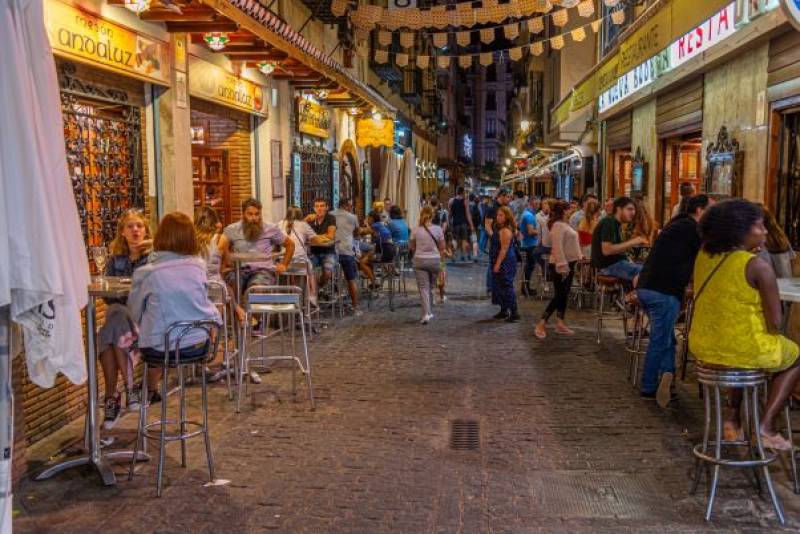
FEATURED ARTICLES: "Are Spain’s bars really about to close earlier?" and "Mythbusting the Spanish water bottle suspicion"
Happy International Women’s Day!
It’s that day of the year day, March 8, when we recognise the immense value of women’s empowerment, protect their rights and ensure they have the opportunity to reach their full potential. As if one day a year were enough.
In Spain, they normally go quite big on the occasion. Ayuntamientos around the country host official ceremonies with readings of the Women’s Manifesto and women’s organisations hold organised marches through many town and city centres with people wearing the signature purple to draw attention to how far we still have to go to achieve full equality and secure women’s rights in society.
This week, we’ve got stories for you about a possible threat to a Spanish institution – staying up late on a summer’s evening sitting on a bar’s terrace drinking a beer and having a tapa – and the toppling of another Spanish institution – that weird habit people have of putting bottles full of water outside their houses – plus the other major stories coming out of Spain this week.
More fires in Valencia
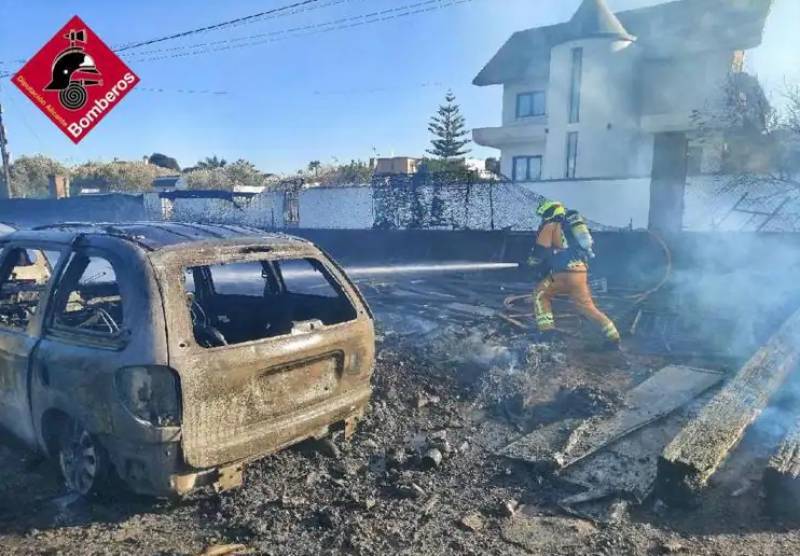
A series of tragic events has struck Alicante in the form of three devastating fires within the span of a week. One occurred this Monday, March 4, when a fire broke out in a 24-storey apartment complex in the town of Villajoyosa, near Benidorm.
According to the Emergency Information and Coordination Centre (CICU), the blaze started on the eleventh floor and quickly spread, resulting in the deaths of three member of the same family – a grandmother, her son and her 15-year-old grandson.
Incendio en Villajoyosa pic.twitter.com/4olZfeoNsB
— F11 Peacekeeper (@frann636) March 4, 2024
This unspeakable tragedy comes as the community is still reeling the fire that devastated Valencia less than a fortnight ago, when a fierce blaze swept through a building of 138 homes located in the Campanar neighbourhood, killing 10 people.
On Friday March 1, another fire broke out in the Los Balcones urbanisation of Torrevieja, destroying a dozen cars and threatening nearby homes. The blaze started in a rural plot on Calle Germanías and quickly spread to adjacent plots, including a scrubland parking area containing approximately 25 vehicles.
Luckily, no injuries were reported during the incident, but the fire caused widespread panic among locals who witnessed thick, black smoke billowing over the Orihuela Costa.
The Green Party (Verdes-Compromís) has criticised the Torrevieja City Council for their alleged inaction and failure to comply with the General Urban Planning Plan (PGOU) in relation to the fire, which took hold on protected land in the Lagunas de la Mata and Torrevieja Natural Park.
Former councillor, José Manuel Dolón, also pointed out that the burned-out vehicles were parked in an “illegal storage establishment”, one of many irregular plots in the area.
Residents of Torrevieja were once again jolted awake in the early hours of Wednesday March 6 by a terrifying fire that took hold in a palm tree nursery located next to the AP-7 motorway. For the second time in a matter of days, the densely populated areas of La Coronelita and Los Balcones were situated dangerously close to a raging inferno.
The blaze engulfed the young saplings in mere minutes, prompting emergency responders from the Provincial Consortium and the forest firefighters of the Generalitat to race to the scene shortly after midnight. It took several hours to bring the fire under control, and the trees were still smouldering several hours later.
These recent fires have left the community shaken and grieving, while local authorities are working tirelessly to determine the causes of the fires and prevent future incidents from occurring.
Closing time

Most people enjoy a drink while they’re on holiday and Spain’s buzzing nightlife and relaxed pub culture is one of the many draws for tourists from the UK and further afield. But a recent suggestion by Labour Minister Yolanda Díaz that bars and restaurants should be made to close much earlier has the entire industry up in arms, not to mention the customers.
“It is crazy to try to continue extending the hours until we don’t know what time,” she stressed, highlighting the huge difference between closing time in Spain and the rest of Europe.
It’s “unreasonable”, she added, to expect pubs to remain open past 1am.
However, this idea has been met with resistance from various groups, including Madrid’s president, Isabel Díaz Ayuso, who supports freedom and flexibility in the hospitality sector, and España de Noche, an employers’ association representing the leisure and nightlife industry.
Madrid’s president took to social media to express her disapproval, emphasising Spain’s renowned nightlife and its contribution to job creation. Similarly, industry representatives argue that the minister’s proposal unfairly targets pubs and restaurants, and that a genuine discussion about opening hours must also encompass other night-time leisure activities, such as shopping centres and late-night television programs.
España de Noche warned of a huge backlash against the proposal. A booming nightlife “is one of the pillars of Spain being the top country in the world in vacation tourism,” a spokesperson said, “so any experiment that endangers our lifestyle, our tourist attraction and the activity of companies in the sector, only can cause social and business rejection.”
Such has the reaction against this suggestion been from all sectors of Spanish society that it makes you wonder what Minister Yolanda Díaz was up to when she said it. It’s likely that this idea will quietly be dropped as a non-starter and never mentioned by the government again, though you can bet that the opposition will bring it up at any given opportunity.
The Amnesty Bill
Unless, that is, they are too busy targeting the government for their extremely controversial amnesty bill.
 Spain’s ruling Socialist party, the PSOE, and the Catalan separatists, have managed to push through the Amnesty Law this week. It is a bill which has divided citizens and politicians alike and which has led to months-long demonstrations up and down the country.
Spain’s ruling Socialist party, the PSOE, and the Catalan separatists, have managed to push through the Amnesty Law this week. It is a bill which has divided citizens and politicians alike and which has led to months-long demonstrations up and down the country.Technically, the bill still has to be debated in Congress next Thursday before being turned over to the Senate, which will check that it doesn’t majorly contravene any EU regulations, but at this stage that’s little more than a formality and it seems almost certain that the Amnesty will be passed into law. It’s now only a matter of time.
The main reason so many people have a problem with the Amnesty Law is that it essentially sets out to redefine terrorism so that dozens of pro-independence political leaders and activists can be pardoned for past crimes. One of the most infamous beneficiaries of the new bill would be former Catalan president Carles Puigdemont, who is currently been investigated by Spain’s Supreme Court for alleged acts of terrorism relating to an illegal independence referendum in 2019 which sparked a wave of protests.
The court believes he may have orchestrated demonstrations near Barcelona’s airport, which although peaceful, might fall under the umbrella of terrorism according to Spain’s expansive anti-terrorism legislation, updated in 2015 to encompass “street terrorism”.
To address this and enable the possibility of offering amnesty to Puigdemont, lawmakers from Spain’s progressive coalition government introduced modifications to the original bill earlier this week. By doing so, they aim to create a pathway for the pardoning of individuals like Puigdemont, whose actions, while politically motivated, did not involve violence or harm to others.
While the Spanish government and the separatists are overjoyed with this huge step forward, most ordinary people and especially the country’s right-wing politicians are outraged. PP spokesperson Cuca Gamarra described the Amnesty as an “unjust, immoral and unconstitutional law” that will enable the separatists to stage another coup, this time with total impunity.
And it would seem their fears are well-founded, since the Catalan parties have hinted more than once that the recent agreement does not signal the end of their pursuit for independence.
What’s really up with those water bottles?
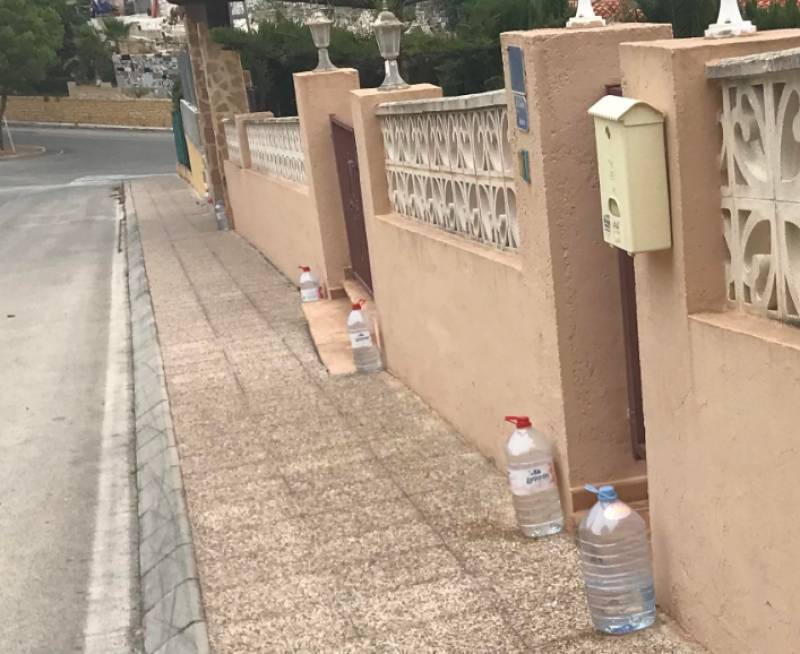
There are many quaint customs and urban legends that have secured themselves so firmly in the popular imagination that they have passed from myth into reality and, far from being an exception, Spain could well be the nation that proves the rule. One of the most enduring yet peculiar traditions has to do with preventing dogs and cats doing their business on private property.
Anyone who has taken a stroll through a residential area anywhere in the country can’t have failed to notice big bottles of water standing sentry outside garden gates and front walls.
The wacky idea stems from the belief that the containers serve as a visual deterrent. Homeowners believe that the bottles will prevent dogs from urinating on walls and footpaths, and keep cats out of their gardens and flowerbeds. However, this method is based on a myth and lacks any scientific backing.
Proponents of the technique argue that the reflection or refraction of light through the water in the bottles will scare off pets, making them less likely to mark their territory. While the theory appears somewhat plausible, studies have shown that dogs and cats are primarily driven by their sense of smell, and are thus more likely to be attracted to the scent of urine rather than repelled by visual deterrents.
In reality, the smell emanating from the water bottles can actually draw dogs closer, making them more inclined to urinate in the area. Cats, on the other hand, seem to ignore the water bottles altogether and continue to do their business where they please.
But even though water bottles definitely don’t work, there are a few things you can do to stop dogs and cats peeing and pooping on your property.
Commercial or homemade odour neutralisers appear to have had some success, with things like vinegar and water solutions, citrus peelings, coffee grounds and paprika especially popular. Additionally, creating physical barriers like small fences or plants can deter pets from approaching walls and footpaths.
Murcia
Last week we told you that there would be a total of 22 flight destinations available at the Region of Murcia International Airport this summer season, but a last-minute announcement from Ryanair this week about another new international flight destination being added to the roster takes the total up to 23, with a possible 24th still to come.
So where has Ryanair decided is the best airport in the world to launch a direct flight route with the Region of Murcia? Belfast? Newcastle? Maybe somewhere (anywhere!) in the Netherlands or Scandinavia? Nope. They’ve decided that this summer season they’ll have twice weekly flights between Corvera Airport and a third Moroccan city, in this case Marrakesh.
Air Arabia already do flights to Oujda and Casablanca from Murcia, and now Ryanair is getting in on the demand for Morocco flights, mostly from the large Moroccan community living in the Region.
As well as that, there have been hints that, while the flights to Prague and Brno in the Czech Republic will probably not be coming back this year, another flight route may yet be added to the Czech city of Ostrava. And if more changes can still be made at this late stage, just a few weeks out from the start of the summer season, then there’s still the slim chance of more European connections to come. We live in hope…
If you were flying in or out of Corvera Airport this Thursday, you may have spotted fire crews and rescue workers swarming around near the airport apparently treating a number of injured people. There was no emergency, though, or at least not a real one. It was just a drill simulating an aeroplane crashing so that emergency response crews could practise in case of a real-life disaster situation.
 Over 250 people, including firefighters, police, paramedics and psychiatrists, took part in the training exercise, which imagined what would happen if an A319 type aircraft with 100 people on board lost altitude while trying to land at Murcia Airport and had to make a crash landing, injuring and killing several people.
Over 250 people, including firefighters, police, paramedics and psychiatrists, took part in the training exercise, which imagined what would happen if an A319 type aircraft with 100 people on board lost altitude while trying to land at Murcia Airport and had to make a crash landing, injuring and killing several people.In order to make the exercise more realistic, extras were used to simulate injured people and the Family Room within the airport terminal itself was included in the drill, with extras playing the role of family members of passengers and crew members who needed to receive psychological care. None of the programmed flights in or out of the airport were affected by the drill.
On Camposol, residents have been alarmed by the heavy police presence around the urbanisation of late. For instance, this Monday afternoon the Guardia Civil blocked the eastbound carriageway of Avenida de los Covachos between Sectors D and C for around half an hour for some unknown reason, while a large joint police operation focused on Camposol and Mazarrón town last week resulted in approximately 25 people being found with irregularities in their documentation, among other issues.
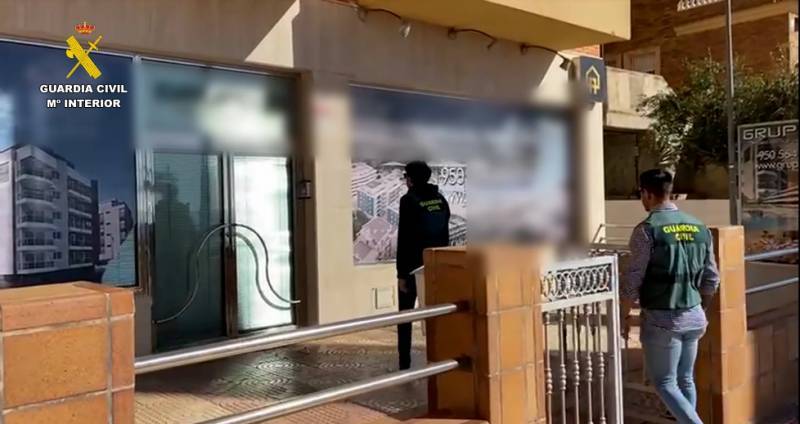 Over in Águilas and over the border into Andalucía, three top executives of real estate development company Grupo 21 have been arrested by the Guardia Civil on charges of document falsification and fraud. The suspects are accused of selling homes in residential projects that did not exist, defrauding hundreds of unsuspecting buyers.
Over in Águilas and over the border into Andalucía, three top executives of real estate development company Grupo 21 have been arrested by the Guardia Civil on charges of document falsification and fraud. The suspects are accused of selling homes in residential projects that did not exist, defrauding hundreds of unsuspecting buyers.It seems that Grupo 21 had been engaging in a systematic scheme to deceive potential property buyers across the south of Spain using high-pressure sales tactics and false promises to convince them to purchase homes in developments that never even existed. It was a sophisticated scam that involved falsifying documents to make it look as though the company owned plots of land where the developments were supposed to be built, and even advertising the fake projects so that potential buyers would put down a 10% deposit. In total, they managed to take around 20 million euros from more than 1,200 people in this way, pocketing all the cash and leaving many of the affected families financially ruined, struggling to make ends meet after losing their life savings.
On a nicer note, in Águilas this weekend there is a classical music concert of violin pieces by Shostakovich and Tchaikovsky, part of the Pro Música cycle, as well as Dvorak’s Requiem being performed in San Javier. You can also spend the day at the Purple Power Fest in La Manga this Saturday for live music and fun events for all the family, or check out the start of the Fiestas de San José in Puerto de Mazarrón.
Check out our EVENTS DIARY for more ideas of what to do in the Region of Murcia:
Spain
 It’s fairly common practice in Spain and elsewhere for certain food items and other products to be recalled from the market due to impurities or labelling issues, and this rarely causes too much drama or worry. However, panic was sparked among consumers this week when it was discovered that strawberries imported from Morocco for sale in Spanish supermarkets contained traces of Hepatitis A.
It’s fairly common practice in Spain and elsewhere for certain food items and other products to be recalled from the market due to impurities or labelling issues, and this rarely causes too much drama or worry. However, panic was sparked among consumers this week when it was discovered that strawberries imported from Morocco for sale in Spanish supermarkets contained traces of Hepatitis A.Hepatitis A is a viral infection that affects the liver, causing inflammation and damage to the organ. The virus is primarily spread through contaminated food and water, as well as through direct contact with an infected individual.
While most people who become infected recover completely, the symptoms can be nasty and include fever, fatigue, loss of appetite, diarrhoea, nausea, abdominal pain, dark urine and jaundice.
It’s believed that the strawberry contamination may have occurred due to the presence of faecal matter in the water used for irrigation on Moroccan farms. The infected fruit has been removed from the shelves but several associations are now demanding that the EU implement stricter controls on food coming in from third countries.
Wondering if now is a good time to make the move to Spain, or invest in a holiday home here? Well, the latest reports on property prices show that the Spanish housing market is continuing to rebound during the first quarter of 2024, with prices rising and transaction numbers increasing thanks to relatively low interest rates and continuing demand from foreign investors.
Housing prices in Spain increased slightly by 0.4% in February, reaching an average price of 2,056 euros per square meter, according to official data released in early March. This represents a 7.2% year-on-year growth, but remains 2.8% below the country’s historic peak in housing prices in June 2007.
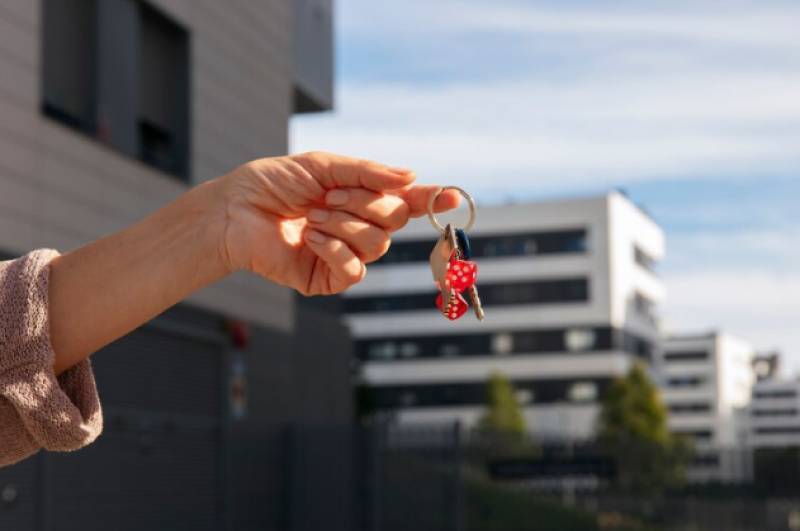 Overall, 13 of the 19 regions on Spain experienced positive growth, with the Canary Islands leading the way (prices are up 1.5%). But one of the real stand outs is the Region of Murcia, with a whopping 7.2% annual growth rate in housing prices, representing the third largest increase among all autonomous communities. The Region has also seen a 2.4% increase in housing prices over the past quarter.
Overall, 13 of the 19 regions on Spain experienced positive growth, with the Canary Islands leading the way (prices are up 1.5%). But one of the real stand outs is the Region of Murcia, with a whopping 7.2% annual growth rate in housing prices, representing the third largest increase among all autonomous communities. The Region has also seen a 2.4% increase in housing prices over the past quarter.In terms of prices then, the Balearic Islands remains the most expensive place to buy property, with an average cost of 4,191 euros per square metre. They were followed by Madrid (3,292 euros), the Basque Country (2,883 euros), the Canary Islands (2,501 euros) and Catalonia (2,338 euros).
Unlike booking a flight, which you can normally do at least six months in advance, Spain’s main rail operator Renfe only allows customers choose a train ticket two months before their date of departure. Its competitors, Iryo and Ouigo, are a little more flexible, but the stickler is that they then reserve the right to change everything from travel times to routes.
But now, Spain’s rail industry is set to undergo a major transformation, with the National Markets and Competition Commission (CNMC) pushing for a significant extension of the current two-month advance booking window for train tickets.
The CNMC’s decision will have a very real impact on passengers, enabling them to plan their trips much farther in advance. By releasing train schedules earlier, travellers will have more time to prepare and adjust their plans accordingly. Moreover, the change will likely prevent the other two rail operators from making last-minute schedule changes, ensuring greater stability and reliability for passengers.
While the exact timeline for the implementation of the new policy has yet to be announced, a spokesperson for the CNMC noted that the European Commission recommends putting tickets on sale approximately six months ahead of time, similar to airlines and buses.
Alicante
At the beginning of 2019, a powerful Gota Fría storm ravaged the coastal promenade in Cabo Roig, leaving behind massive sinkholes and damaging the stone wall that supports the popular cliff walk. Despite numerous attempts to repair the damage, new gaps have begun to appear in the same area, posing a significant threat to pedestrians.
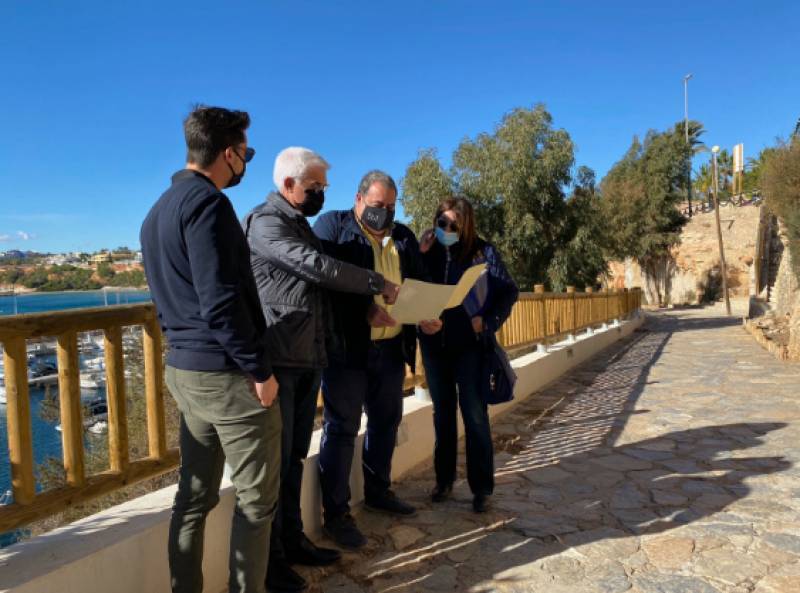 On January 31 this year, an environmental inspector from the Coastal Demarcation identified a new hazard along the pathway, which offers breathtaking views of the coastline. Located at the rear of plot number 5 on Calle Lebeche, the overhanging cliff now features two holes in the stone wall that looms above the promenade. These holes put the entire walkway at risk of landslides and erosion, endangering pedestrians who frequent the area.
On January 31 this year, an environmental inspector from the Coastal Demarcation identified a new hazard along the pathway, which offers breathtaking views of the coastline. Located at the rear of plot number 5 on Calle Lebeche, the overhanging cliff now features two holes in the stone wall that looms above the promenade. These holes put the entire walkway at risk of landslides and erosion, endangering pedestrians who frequent the area.Following the discovery, the Orihuela City Council swiftly cordoned off the area and has posted warning signs to alert pedestrians of the potential danger. The council is responsible for maintaining the area, but the cost of repairs would ultimately be borne by the property owner, who is understood to be a foreign national.
Pending a long-term solution, pedestrians are advised to exercise caution while walking along the affected stretch of the promenade.
Archaeologists and historians in Alicante have recently made two thrilling discoveries of ancient ruins, providing valuable insights into the region’s rich history.
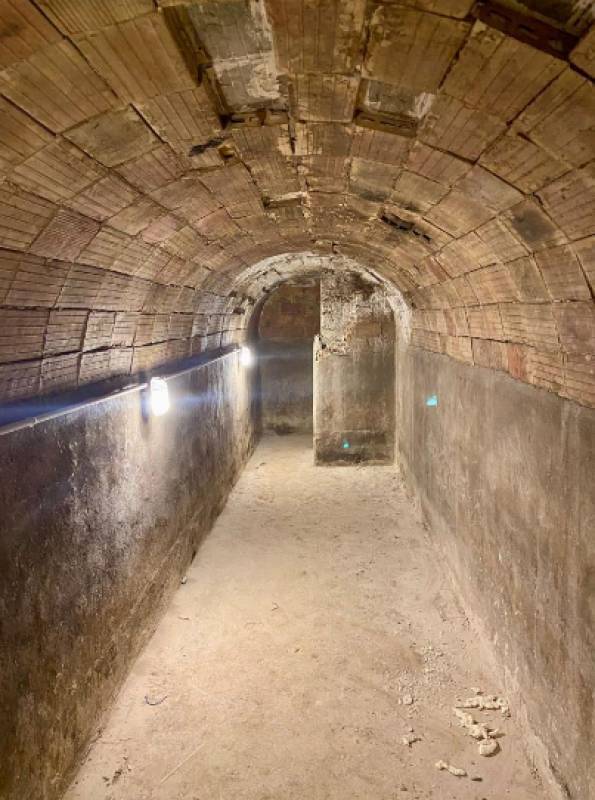 The first discovery was a hidden tunnel dating back to the Spanish Civil War, unearthed during the foundation digging process for a new housing complex. This surprising find has shed light on the war’s impact on the region and the tactics employed by soldiers during that time.
The first discovery was a hidden tunnel dating back to the Spanish Civil War, unearthed during the foundation digging process for a new housing complex. This surprising find has shed light on the war’s impact on the region and the tactics employed by soldiers during that time.The shelter, situated on Avenida Elche, was discovered during archaeological explorations conducted by AEDAS Homes, the developer responsible for building a complex of 35 homes on the site.
The second finding, located in the Benalúa Sur neighbourhood, was a collection of Roman ruins dating back to the 6th and 7th centuries. This era marked the transition from the Ancient Ages to the Middle Ages, making the structures nearly 1,500 years old. The discovery has sparked excitement among experts, who believe that the buildings could have been constructed during this timeframe.
These discoveries highlight the wealth of history buried beneath Alicante’s modern streets and emphasise the significance of continued archaeological research in the region.
Andalucía
Work continues apace to bring the AVE to Almería and to bury the train tracks that run through the city so that they go underground instead of cutting the city in two. In fact, they’re already at the point where they’re about ready to open up a section of the recently flattened and prepared ground to allow people to take a shortcut to cross from one side of the city to the other, and they have also stopped all trains arriving at the Almería train station for the next two years.
That’s right, until 2026 you will not be able to get in or out of Almería by train. Of course, there will be a bus replacement service which will take Madrid and Granada passengers between the bus station, which is located in the same building as the train station, and the station at Huércal-Viator, which is the new end of the line.
In fact, by coach has long been the preferred method of public transport for getting to and from Almería city anyway, so the current lack of trains isn’t such a great loss. But that is exactly what they’re trying to change with all this expensive and lengthy construction work – to join it to the high-speed network and to the Mediterranean Corridor and to finally make the Almería trains worthy of a major Andalusian provincial capital.
For its part, Granada is getting a new year-round direct flight connection to Amsterdam as of this coming September. The Netherlands’ second largest airline, Transavia, has promised to make this a permanent fixture of the Granada flight roster after the summer season, with two return flights a week between Amsterdam and the Federico García Lorca Airport.
New year-round Granada-Amsterdam flights to begin in September
There will be two weekly flights between the Netherlands and Granada, which will be operated all year round
This was announced at the international airline summit Capa (Center for Aviation) Airline Leader Summit 2024, one of the most important aviation activity congresses in the world that brings together two hundred executives from airlines from all over the world.
Tickets will go on sale starting next month, which is also when the Granada flights to London Gatwick Airport return.
Moving west along the coast to Benalmádena on the Costa del Sol and the could soon be changes there, too, as the abandoned Los Pintores hotel complex, which has been closed since 2008 due to the financial crash, is set to be torn down.
Estate agents Aliseda Inmobiliaria have formally requested the hotel’s three buildings be demolished so they can sell the plots of land, which are appealingly located on the second row back from the beach, to “hotel or residential” developers.

You may have missed…
- HRT: What we know now about Hormone Replacement Therapy, menopause and women’s health.
Once hailed as the elixir of life, Hormone Replacement Therapy (HRT) found itself in hot water back in 2001 after a Women’s Health Study raised concerns about potential risks, particularly regarding breast cancer and stroke. But opinions about the usefulness of HRT are changing and where we stand today is very different from 20 years ago. - The time when southern Spain was floating between Africa and the Iberian Peninsula.
Believe it or not, there was a time about 8 million years ago when the south of Spain – including basically all of Andalucía, Murcia and up into Alicante province and up to Valencia – was an archipelago between the Mediterranean Sea and the Atlantic Ocean. - Complete guide to campervan rules and regulations in Spain.
Driving a motorhome, caravan or campervan through Spain can be an exciting adventure, offering the freedom to explore new destinations and experience the great outdoors. However, before embarking on your journey, it’s essential to understand the specific regulations and guidelines that govern these vehicles. - Region of Murcia unveils 18.6 million aid plan to support local farmers and ranchers.
Following weeks of heavy pressure from protesting farmers, the Region of Murcia government has pledged 18.6 million euros in aid to support the agricultural sector. - The alternative to tiling for your Spanish home: What is waterproof flooring?
Many Spanish homes use tiles or slabs to ‘pave’ floors of terrazas and other parts of the property, but there is a waterproof alternative that homeowners are finding increasingly attractive due to its smooth, modern finish...
So there we have it for another week. Hope you enjoyed it, and we’ll have another for you next time.
See ya!
Contact Murcia Today: Editorial 000 000 000 /
Office 000 000 000





















